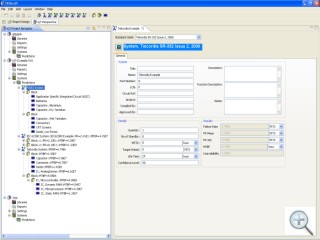FIDES 2022 (IEC 63142 ED1) Electronic Reliability Prediction
The latest release from ITEM Software is an extraordinary collection of new capabilities that provides a customizable, cross-platform, multi-user, open frame-work. Built on proven
and recognized analysis engines, ITEM QT (iQT) is a revolutionary approach to reliability, safety, and risk analysis software tools. With iQT, you are no longer limited by the technology choices of software vendors
or chained to infrastructure requirements of their products.
The FIDES (IEC 63142 ED1) module of iQT is a reliability prediction tool based on the FIDES Guide 2022 methodology (UTE-C 80811), the development of which was funded by DGA (French MoD) and companies of the FIDES Group (Airbus France, Eurocopter and Thales). The FIDES methodology models
failures whose origins are intrinsic (item technology or manufacturing and distribution quality) and extrinsic (equipment specification and design, selection of the procurement route, equipment production and
integration) to the items studied.
The methodology takes the following into account:
- Failures resulting from development or manufacture errors.
- Overstresses (electrical, mechanical, thermal) linked to the application and not listed as such by the user (the occurrence of the overstress remains hidden).
FIDES Methodology:
- Include new technologies
- Take into account all the influences on reliability, such as :
- Technologies
- Application (naval, airborne, avionics, automotive, industrial...)
- Product Life cycle (specification, design, manufacture, system integration, maintenance)
- Real Mission Profile of the Product
- Actual use conditions (thermal, mechanical, electrical,.)
- Overstresses
The FIDES methodology applies to all domains using electronics :
- Aeronautics
- Space
- Navy
- Military
- Automotive
- Railways
- Industry
- Production and distribution of electricity
- Telecommunications
- IT, home automation systems, electrical appliances, etc.
The FIDES methodology covers items from elementary electronic components to electronic modules or subassemblies with well-defined functions.
The FIDES coverage of component families is not fully exhaustive. However, it is sufficient to allow a representative assessment of the reliability in almost all cases.
The methodology applies to COTS (for which it was originally developed) and also to specific items whose technical characteristics match those described in this guide.
The COTS (Commercial Off-The-Shelf) acronym designates all catalog-bought items, available on the domestic or foreign market, with a supplier P/N, and for which the customer has no input on the definition or production. This item may be modified, its production or maintenance stopped with no possible opposition from the customer. There may be only one or several suppliers for each item.
The FIDES methodology is intended to predict realistic reliability levels, close to the average values usually observed (by contrast with pessimistic or conservative values).
An essential question when predicting reliability is the degree of confidence in the value. This question is all the more important that the users have no confidence in the raw results produced by previous methodologies, and that reliability control (quantification and engineering) has become essential for all projects.
One of the aims of the FIDES project is to build this confidence. However, obtaining an exact prediction is not the sole purpose of the FIDES methodology: identifying and controlling the factors affecting reliability may be considered even more important.
Focused on reliability, safety, and risk assessment, our iQT product is a highly extensible framework that provides common infrastructure for any kind of system modeling.
The capable nature of iQT is achieved by an existing Java platform foundation that is widely supported in your business environment. By following the predefined interface, your team has the ability to create plug-ins that extend the capabilities of iQT . The following are examples of possible iQT extensions:
- New editors or viewers for a given model (file) type
- New quantification model types
- New result types
- New analysis engines
The well-established core services of this platform provide the essential functionality to model and analyze reliability, risk and safety projects. Regardless of the configuration of a particular installation, the core services are available in the framework.
All extensions are highly modular. By allowing capabilities to be added to or removed from the software without affecting other extensions, new functionality, perhaps a new prediction standard, can be added without requiring reconfiguration or redesign of the source code.
iQT is a fully functional open environment, supporting the addition of third-party plug-ins such as:
- Version management plug-ins
- Project management plug-ins
- Third-party computational environment tools (e.g. MATLAB)
- Third-party modeling tools (e.g. data analysis)
- Documentation tools (e.g. PDF viewers)
- Search tools
- Customizable, cross-platform, multi-user, open-framework
- Built on proven and recognized analysis engines
- Update manager allows the user to upgrade to the latest version online
- Refrains from loading and creating models until needed, dramatically reducing memory usage and startup times
- Easily create or modify existing prediction approach with a prediction module editor
- True cross-platform capabilities through Java-based framework and analysis engines
- Library function allows automated update of models
- Easily revert to any previous version of a model
- Restrict access to particular models to one user or group
- Create different branches and variations of the same model for 'what if' investigations
- Merge project work from multiple teams into a single project
- Designed by engineers for engineers
- Fully functional open environment supporting addition of third party plug-ins
- Stores external documentation like MS Word, PDF or CAD drawing files
- Configurable to interface with other programs
- Powerful, proven and configurable quantification engines
- Open standard allows users to make changes to the model outside of iQT
|

> Electronic Reliability Prediction Software
> Based on FIDES Guide 2022 Methodology
> UTE-C 80811
> IEC 63142 ED1 Standard
> Also Includes FIDES 2009 Methodology
> Customizable, Multi-User, Open-Framework
> True Cross-Platform Capabilities
> Modular Design Allows Choice of Analyses
> Supports Third-Party Plug-Ins
> Extensive Reporting and Charting Facilities
> Stores External Documentation
> Configurable Quantification Engines
|